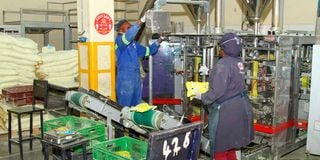
Employees at Osho Chemical Industries in Nairobi in the past.
Manufacturers have warned of a freeze in new employment, shut down of low-margin production lines and a switch to importation if last year’s elevated operating costs climb further in 2024.
Investors in the largely struggling sector said they endured a torrid operating environment in 2023, with overall business costs bumping by about a third compared with the year before.
Operating costs jumped between 31 and 34 percent last year, according to feedback from factories, compared with the 11 to 15 percent range in 2022.
Industry captains largely blamed the rise in expenses to depreciation of the shilling against the US dollar, higher cost of goods and services (inflation), additional and higher taxation, increased interest rates, as well as a jump in fuel and electricity charges.
Manufacturers, as a result, experienced increased finance costs for loans, inputs such as raw materials which are sourced from abroad and packaging materials.
Osho Chemical Industries Ltd, a manufacturer, marketer and distributor of agricultural inputs, industrial chemicals, veterinary products and livestock nutritional supplements, says operating costs went up by about 32 percent compared with 12 percent in 2022.
The firm, founded in 1993, raised prices by about 15 percent to recoup some of the costs emanating from “devaluation of shilling, higher and new taxes and general rise in prices of goods and services”.
“Our plan is to defer investments and expansion plans, freeze hiring, minimise wage adjustments and reduce headcount [to regain the losses that were not pushed onto consumers],” Osho founder and chairman Manoj Shah said.
Pwani Oil Products Ltd, set up in 1981, also failed to pass on the entire cost of running business to buyers, citing cut-throat competition and affordability at a time consumer purchasing power had been eroded.
The firm, whose main raw material is palm oil imported from Indonesia and Malaysia, is the maker of a range of cooking oil and fat products such as Fresh Fri, Salit and Fry Mate as well as soap brands like Ushindi and Sawa.
“We should be passing on everything but the end result is that affordability levels don't allow for people to buy,” Rajul Malde, the commercial director at Pwani Oil, said.
For Bharat Shah, the chairman of Kenafric Industries which was founded in 1987, last year saw one of the fastest rise in operating costs in recent years. The manufacturer of confectionery, culinary and powdered juices says costs bumped 34 percent in 2023, nearly three times more than 13 percent in the previous year.
Mr Shah says expenses were largely driven by a combination of finance costs and a weaker shilling which rocketed 110 percent, fuel and electricity bills which surged 38 percent while raw materials and packaging cost went up four percent.
Unlike other firms, Kenafric managed to fully pass the additional costs to consumers, partly because of the considerable share of low-priced goods in its portfolio of products.
Mr Shah, however, warns that a further rise in business costs will be difficult to pass onto consumers this year.
These experiences largely capture the battles manufacturers are fighting despite being one of the key sectors at the centre of President William Ruto’s Bottom-Up Economic Transformation Agenda “geared towards economic turnaround and inclusive growth”.
The Ruto administration has pledged institute policies which will expand the manufacturing sector’s contribution to the gross domestic product — a measure of all economic activity by individuals, companies and government — from 7.8 percent in 2022 to 20 percent by 2030.






